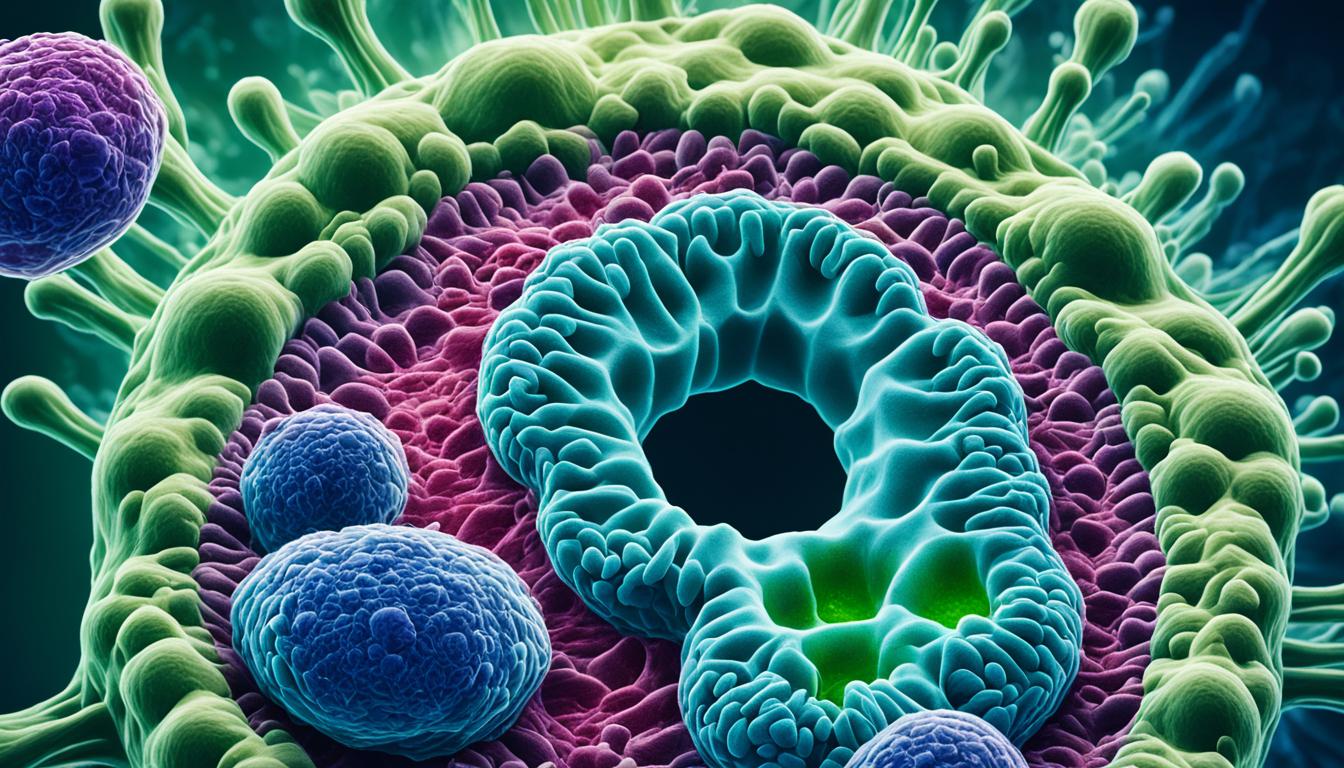Hurthle cell cancer is a rare type of thyroid cancer. It differs from other thyroid cancers in many ways. It starts in Hurthle cells, which are unique cells found in the thyroid. A thyroid nodule is a common way it shows up. It’s usually found through a biopsy.
Having been around radiation or having a family history of thyroid cancer could make you more likely to get it. Treatments often involve surgery or radioactive iodine. Sometimes, doctors might recommend stem cell therapy too.
Key Takeaways:
- Hurthle cell cancer is a rare form of thyroid cancer with distinct histopathological and molecular characteristics.
- Diagnosis of Hurthle cell cancer is typically done through a biopsy of the thyroid nodule.
- Factors such as exposure to radiation and a family history of thyroid cancer increase the risk of developing Hurthle cell cancer.
- Treatment options include surgery, radioactive iodine therapy, and stem cell therapy in certain cases.
- Expert evaluation and management by a specialized thyroid cancer team are crucial for optimal outcomes.
Hurthle Cell Cancer Pathophysiology and Diagnosis
Hurthle cell cancer is a type of thyroid cancer. It comes from the thyroid’s follicles. It’s known by the Hurthle cells it features, which are also called oncocytes. These cells look different from other thyroid cancers. They’re eosinophilic oxyphilic cells with unique round to oval nuclei. They have dense mitochondria, giving them a special look.
To find Hurthle cell cancer, doctors use imaging like ultrasound and a biopsy. This biopsy looks at the cells up close for detailed analysis. The unique look of Hurthle cells helps confirm this cancer type.
Staging is key in diagnosing Hurthle cell cancer. This means figuring out how far the cancer has spread. Size of the tumor, involvement in lymph nodes, and more help determine the stage. Knowing the stage is crucial for starting the right treatment.
Hurthle Cell Cancer Diagnosis: Imaging and Biopsy
Ultrasound is the first step to spot thyroid nodules. It shows which ones might be cancerous. This helps decide if further checks are needed.
A biopsy is done under ultrasound to take samples from a nodule. This is key in seeing if Hurthle cells are there. It confirms if it’s Hurthle cell cancer.
Thyroid cancer specialists are needed for accurate diagnosis and treatment. A team experienced in thyroid cancer plans the best treatment. Their approach is based on the patient’s cancer details.
Treatment and Management of Hurthle Cell Cancer
Treatment for Hurthle cell cancer mainly involves surgery. This can range from the removal of a part of the thyroid to the whole gland. The surgery type depends on tumor size and how far it has spread.
After surgery, patients might take thyroid hormone pills. These pills are to replace the thyroid’s missing hormones. They also help stop any remaining cancer from growing and keep the body’s hormones in check.
For cancer that has spread, radioactive iodine therapy could be an option. This therapy targets any leftover cancer cells to avoid harming healthy tissue.
Stem cell therapy is a new area being looked at for Hurthle cell cancer. It’s being studied to see if stem cells can help in repairing the thyroid. This could improve how well treatments work.
It’s key to remember that Hurthle cell cancer can come back after treatment. How likely this is can depend on many things, like age and how the body responds to therapy. Having regular check-ups and medical care is crucial for staying on top of the disease.
Comparison of Surgical Procedures for Hurthle Cell Cancer
| Surgical Procedure | Description | Advantages | Disadvantages |
|---|---|---|---|
| Thyroid Lobectomy | Removal of the affected thyroid lobe | – Preserves healthy thyroid tissue – Minimizes impact on hormone production – Potentially lower complication rates |
– Higher risk of recurrent disease – Requires careful follow-up surveillance |
| Total Thyroidectomy | Removal of the entire thyroid gland | – Complete removal of cancerous tissue – Eliminates risk of cancer recurrence in the thyroid |
– Lifetime dependence on thyroid hormone replacement therapy – Potentially higher risk of surgical complications |
Conclusion
Hurthle cell cancer is rare and needs special care for the best outcomes. Your age, stage of cancer, and how you respond to treatment greatly affect your chances of getting better. It’s key for healthcare pros to use the American Thyroid Association’s advice, helping patients more.
Surgery, radioactive iodine therapy, and new stem cell treatments provide hope for those with Hurthle cell cancer. By assessing each person’s traits closely, healthcare teams can pick the best treatments. This personal approach helps people live better lives.
Thanks to new research and customized care, more Hurthle cell cancer patients are living longer. With a team of experts and following the latest guidelines, anyone facing this cancer can get top-notch care. This raises their hope for recovery and a good quality of life.

